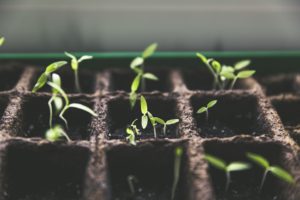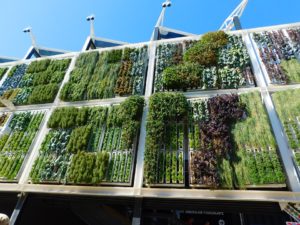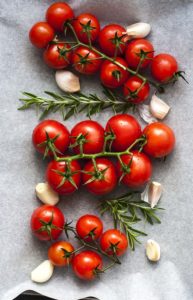Should Every Vegan Grow A Garden?

Urban farming is not a fad but a great solution to many problems we are facing these days. But even on a personal level, there could be a number of reasons to start planting. So, should every vegan grow a garden?
Veganism, by its very definition, is all about caring for the planet. Growing your own food may just be another way to contribute to it. And, by the way, it’s not all that difficult either!
Did you know that urban farming has the potential to produce 10 percent of the global food crops? That’s huge!
Let’s look at some of the reasons why you, as a vegan, should grow your own garden:
There’s Nothing Quite Like Fresh Veggies and Fruits
Yes, all veggies and fruits are healthy and delicious, but let’s be honest, there’s something different about fresh produce. If you’ve lived on a farm or go to a farmer’s market regularly, you’d know the difference. Unfortunately, not everyone lives near a farm or can afford the exorbitant prices of food at those fancy farmer’s markets.
Growing your own garden, however small, can be one way to get your hands on some fresh vegetables and herbs. If you like to cook at home more often, then it’s even highly recommended for you. The fresh ingredients will do wonders for your recipes!
A Carnegie Mellon University study looked at food miles (distance traveled from field to store) found that four percent of greenhouse emissions from food were attributed to transport. So just think about it, you’re cutting that four percent down to zero by literally growing some of the food in your backyard or balcony.
Moreover, many commercial producers use preservatives to keep the food safe during transit. While these preservatives do keep our food safe and good for long, helping reduce food waste, they can’t really beat the freshness you get from something harvested hours ago.
Good for Environment
This one’s a no-brainer, obviously, as growing any kind of plants anywhere contributes to making our environment greener. However, when it’s food that you’re planting, the benefits are two-fold. Not only are you helping reduce carbon dioxide from the air but you’re also helping solve food shortage and insecurity.

The good news is that many cities across America and around the world are taking initiatives to promote urban gardening and creating urban forests. You, as a vegan, should be at the forefront of it, contributing to the movement with your little garden.
An analysis in the journal Cities says that Cleveland, OH, showed the potential of meeting anywhere between 46 to 100 percent of the fresh food requirements of the city solely through urban farming.
If you have an unused space like a barren backyard, a small patio or balcony, or an empty rooftop, now is the time to use it to grow a garden. You can get all scientific-y and research which plants and vegetables have the highest environmental impact with the lowest resource usage. Or you could simply grow what you like!
A Great Hobby
If you’ve been complaining about staying home all the time because of the pandemic, just know that gardening might just be the best use of your time. If you’ve killed a house plant or two before, don’t let that stop you from growing a garden.
Research and find out which crops take the minimal maintenance and grow those. If you really want to go all-in, find something difficult to grow and give yourself a challenge. Either way, you’ll have a great, green hobby that will keep you occupied and pack in some physical activity at the same time.
Here are some of the easiest veggies to grow that require very little maintenance:
- Salad leaves
- Lettuce
- Tomatoes
- Peas
- Spring onions
- Radishes
- Cucumbers
Save Some Money

No, you’re not going to save a fortune growing a garden of a few vegetables or herbs. You’re not even going to save any money any time soon either. In fact, initially, be prepared to spend maybe a few hundred dollars, depending on the size of the garden.
That all said, you will save some money in the long run when your garden is regularly producing and you’re using the food too. Even if you’re not, maybe give those beautiful veggies and herbs to friends and family, or that next-door neighbor.
It all comes down to how serious you are, what your strategy is, and what the climate conditions are. If you’re dedicated to making something substantial out of your little garden, you can even grow it into a business.
According to an article in HowStuffWorks, a 4×8 foot garden in Mid Western climate can bring home savings of $600. That’s not bad at all!
Get Some Vitamin D
Vegans are often associated with certain vitamin deficiencies, such as vitamin B12. While you may think you can’t be deficient in vitamin D, as its main source is the sun, turns out you can and you may be.
According to a 2009 publication in the American Journal of Clinical Nutrition, vegans may be at a higher risk of vitamin D deficiency, as compared with non-vegetarians. That’s because food is also a source of this vitamin and that’s mainly animal-based.
So gardening out in the open with the sun out may just be a great way to get some of that vitamin D.
Vitamin D is essential for our bodies as it helps regulate calcium and phosphorous absorption, which, in turn, are crucial for healthy bones and teeth.
So if you rarely get to spend time out in the sun, you may want to grow a garden to soak up some vitamin D along with your pretty plants.
Wrap Up
Now that you have five good reasons as to why every vegan should grow a garden, perhaps it’s time to decide which plants and vegetables you want to grow. Not only is it good for you but also the planet and those around you, so why not?
If you need some guidance about how to grow a garden, here’s a guide to find your way.











